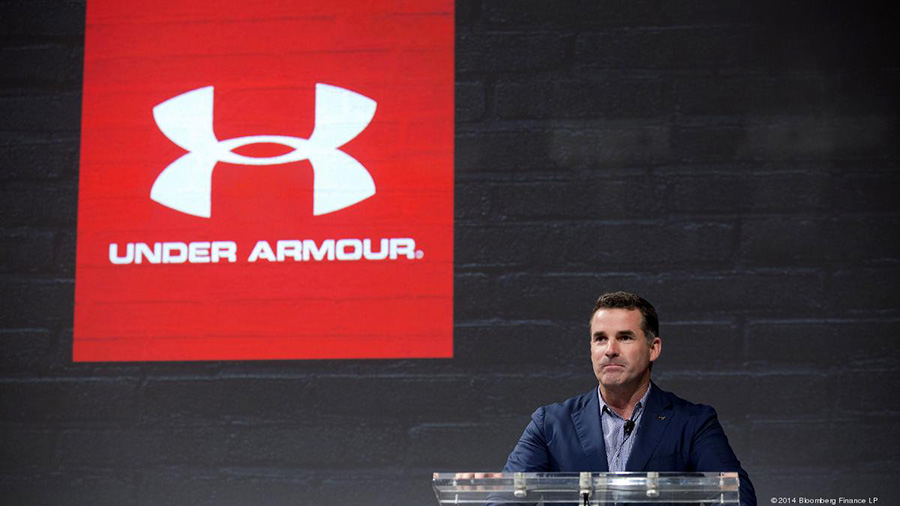Under Armour Inc. agreed to pay $434 million to settle a 2017 lawsuit into claims that the company defrauded shareholders about its revenue growth in order to meet Wall Street forecasts.
Under Armour said it has consistently denied the accusations and entered into this agreement in principle, which is not an admission or finding of fault or wrongdoing.
The suit claims that the Baltimore-based company and its founder and current CEO Kevin Plank misled investors about declining sales and manipulated numbers by propping up future sales. Investors in the lawsuit claimed that the company repeatedly reassured them that a 26-consecutive quarter, 20 percent year-over-year revenue growth streak remained “safely intact.”
In 2017, Under Armour revealed its lower than anticipated fourth quarter revenues to end its streak of 20 percent quarterly growth. The company also announced the unexpected resignation of its CFO after only 13 months on the job. After this news was made public, the price of Under Armour shares fell over 25 percent. The investor suit followed.
The proposed settlement, subject to court approval, averts a scheduled July 15 trial in Baltimore federal court. The settlement must be approved by U.S. District Judge Richard D. Bennett.
In 2021, the Baltimore-based company had agreed to pay $9 million to settle Securities and Exchange Commission (SEC) charges that it misled investors about its revenue growth. The SEC in its investigation found that Under Armour failed to disclose to investors that it employed a sales tactic to accelerate or “pull forward” a total of $408 million in existing orders in the second half of 2015.
Under Armour said it intends to pay the settlement amount of $434 million through cash on hand as well as by drawing on its $1.1 billion revolving credit facility. As previously disclosed, Under Armour had recorded an accrual of $100 million in litigation reserves related to this matter. As a result of this agreement, the company now expects the total accrual to reach $434 million during the first quarter of fiscal year 2025. Following this settlement, the company expects to end fiscal 2025 with approximately $500 million in cash and cash equivalents and no borrowings outstanding under its $1.1 billion revolving credit facility.
The company added in a regulatory filing it had agreed to also continue to separate the roles of the chair and the chief executive officer for a period of at least three years. Plank, who founded the company in 2006, stepped as CEO in 2019 amid continued sales shortfalls, becoming executive chairman and brand chief. He returned to the CEO role in April of this year. Plank at the time agreed to no longer serve as the executive chair of the board, while remaining as a director. Mohamed El-Erian, who has been a lead director since 2020, became the non-executive chair.
Share of Under Armour closed Friday at $6.99, unchanged, on the New York Stock Exchange. Shares had peaked around $52 in September 2015 during the 26-quarter sales streak. News of the settlement came out after the market’s close.
The settlement, if approved by the court, would resolve all claims against Under Armour and other defendants in this matter.
“We firmly believe that our sales practices, accounting practices, and disclosures were appropriate, and deny any wrongdoing in this case,” said Mehri Shadman, Under Armour’s chief legal officer and corporate secretary, in a statement. “Today’s announcement allows us to move past this more than seven-year-old matter so we can avoid the ongoing distraction of litigation and provide certainty to the business at a time when we are executing on important strategic priorities.”
Mark Solomon, an attorney representing the Scottish local government pension North East Scotland Pension Fund (NESPF), called the settlement “an important win for investors and a strong message to the directors and officers of public companies.”
He added in a statement, “Prior government enforcement efforts yielded a modest $9 million penalty. Obtaining a recovery almost 50 times greater underscores the critical role pension funds can play in holding companies accountable” NESPF has been acting as the lead plaintiff in a class action against Under Armour.
A spokesperson for the North East Scotland Pension Fund, which served as lead plaintiff for the class of investors, said in a statement: “We are pleased to have helped secure this exceptional outcome. We decided that stepping forward to lead the litigation and hold defendants accountable was an appropriate exercise of our stewardship role, and we welcomed the opportunity to do so.”
Image courtesy Under Armour
















